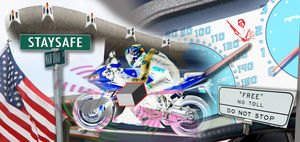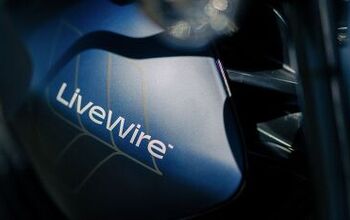Big Brother & Your Bike
Not too long ago, a panel of transportation experts convened in Michigan to discuss the emerging controversy involving vehicle data recorders (VDRs). The panel's focus was on yet another "little black box" being installed on most new vehicles made by Ford and General Motors. It's a fairly innocuous thing, about the size of a cigarette pack, that digitally records about five seconds of data when the vehicle's airbag is activated. Information recorded involves recent speed changes, throttle position, braking application and seat belt use.
Sounds fairly sensible, and quite probably it's even a very useful device for determining the cause of an accident. But stop and think for a moment.
Who owns that information? And what about our constitutional protection against self-incrimination? Does the state, or perhaps your insurance company, have the right to use that information against you to raise your insurance rates, or to prosecute you and perhaps even send you to jail? The consensus among the panel was that, legally, the information belongs to the owner of the vehicle and can't be used without his permission, but... read on.
So, what about your right to privacy or freedom from self-incrimination?
First of all, if you're wondering what this has to do with motorcycling, I couldn't find a single expert in the industry who doesn't believe that VDRs will soon be mandatory on every motor vehicle sold in the US, which, of course, will include our motorcycles. Secondly, it is also worth noting that these devices are capable of recording tons more information than what they currently capture. And, I am told that it would be a simple matter for the NHTSA to require the collection of any data from these devices that they might deem useful to them. The Michigan panel also noted that under some new laws passed recently, the Department of Homeland Security and the Attorney General's office can also access that data. So, what about your right to privacy or freedom from self-incrimination? According to the National Motorists Association (NMA), even if Homeland Security or the AG isn't interested in your "private" information, you have probably already waived your right to privacy by way of a clause in your insurance policy, promising that you will "cooperate" with your insurance company by granting access to any information that could conceivably help settle a claim....you have probably already waived your right to privacy by way of a clause in your insurance policy, promising that you will "cooperate" with your insurance company by granting access to any information that could conceivably help settle a claim. You might be able to secure a court order to stop them, but don't bother, because I'm also told that virtually any state agency could still access your data, under the "implied consent" clause that is standard in most states as part of your being issued a driver's license.
You might be thinking at this point that at least you're safe from this invasion unless and until you break the law, or get involved in an accident. Wrong again. Already, certain models of cars with on-board GPS systems can transmit your data to anyone with a receiver and an access code -- hopefully, that would be a legally-recognized law enforcement agency. But who knows? You won't even know when it's being done. And even if your vehicle isn't equipped with GPS, don't worry, they've got that covered, too. Soon, all the VDRs will be equipped with wireless Internet capability, so that State Trooper following you can simply tap your license plate number into his keyboard, and download your every move for the past several weeks. Not to mention he won't need radar anymore to clock your speed -- your car or bike will do it for him, and even tell him if you were speeding last Tuesday.
Now, I don't believe that Americans will ever stand still for the speed governors, but then again, I don't believe anyone in the US is even considering that option. What they're pushing for here, instead, is the automated fine system, so you can basically speed all you want, so long as you're prepared to pay for it. After all, that is the American Way, isn't it? But don't think you might get away without paying, because our government, though not interested in making the system capable of physically slowing us down, is in favor of adding a "start inhibitor," that would simply immobilize your vehicle if you have unpaid traffic fines. A neat solution, and one that clearly points out that though the proponents of these systems will beat their collective breasts and cry "safety" when extolling the plan, they are not quite so interested in public safety as they are in "revenue generation." The Federal, State and local governments, and especially the insurance companies, will win big. And we, the motoring public, will lose. They will console us with their mantra that it makes the world a safer place.
Maybe I sound like a wild-eyed conspiracy theorist, but when in our history has our government ever opted for less regulation on our motoring? And the systems I describe here aren't science-fiction, they're already here, and in use in several places. And quite frankly, I doubt that there is a damn thing we can do about it.
More by Fred Rau





























Comments
Join the conversation